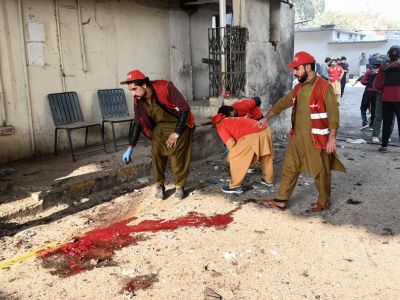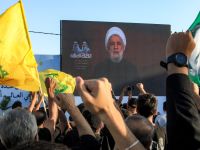Syrian President Bashar Assad said on Monday that a war with Israel was a distinct possibility, and in such a scenario, Israel would be on the losing side in the long term. He also said that "the Oslo Accords no longer exist."
Assad made the comments in a brief interview with the London-based Al Sharaq Al Awsat newspaper.
"The possibility of war with Israel has existed all the time, before (Prime Minister Ariel) Sharon took power and now during his term," said Assad.
"We believe that military strength is likely to lead to victory in one or several battles, and in the short term Israel will win," he said. "But Israel will be the main loser in a long-term confrontation, not Syria."
Israel asked the United States on Friday to assure Syrian President Bashar Assad that it does not seek escalation on the Lebanese border, said reports.
The Israeli call followed reports that the Lebanese Hizbollah resistance movement had moved close to Israeli forces near the divided village of Ghajar.
The director general of the Israeli defense ministry, Amos Yaron, told reporters that he made the request at a meeting with US State Department officials, said Reuters.
Yaron held talks with Deputy Secretary of State Richard Armitage.
"We don't have any kind of intention to open a second front and we ask our American friends to send the right message to Bashar Assad that there is no intention from our side to escalate the situation," Yaron said.
"We talked about the delicate situation on our northern region regarding the activities of the Hizbollah group, specifically Ghajar village," he added.
Hizbollah, which attacked Israeli forces in Lebanon for years until they withdrew last year, has taken up positions just hundreds of yards from Israeli troops at the edge of the village, which spans the line marking the Israeli pullout.
When the United Nations drew the withdrawal line, it assigned the northern two-thirds of Ghajar to Lebanon and the rest to the Golan Heights, Syrian soil which Israel occupies.
In Beirut on Friday, senior Hizbollah official Naim Kassem hinted at the possibility of confrontation in Ghajar, now the focus of attention on the volatile Lebanese-Israeli frontier.
"We consider the places where they (the Israelis) are on our land and our right," he told protesters.
Yaron said: "We still think that the Syrians can control the Hizbollah and have to control the Hizbollah."
Ghajar, an Alawite Muslim village straddling the Syrian Golan Heights and the Lebanese and Israeli borders, was captured by Israel in the 1967 Arab-Israeli war - Albawaba.com
© 2001 Al Bawaba (www.albawaba.com)









